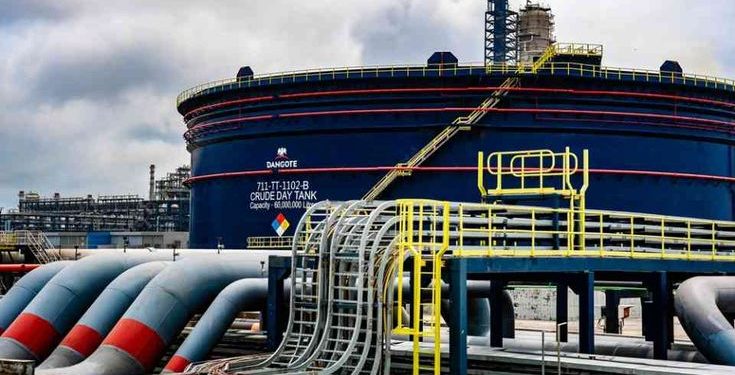The Dangote Refinery has declared that it currently holds over 310 million litres of Premium Motor Spirit (PMS), commonly known as petrol, ready for immediate loading. This announcement comes at a critical moment when petrol prices in Nigeria have risen sharply across various states, with some retail outlets selling fuel for close to ₦1,000 per litre.
Speaking during a facility tour, Devakumar Edwin, Vice President of the Dangote Group, issued a bold challenge to marketers, urging them to bring their trucks and load. According to him, the refinery is more than capable of meeting Nigeria’s domestic demand and still has the capacity to export refined petroleum products abroad. His statement was both a reassurance to Nigerians and a direct response to speculations that the refinery had halted production or reduced supply.
The timing of this declaration is significant. Over the past few weeks, Nigerians have faced widespread confusion and frustration due to fluctuating fuel prices despite relative stability in global crude oil markets and a steady naira exchange rate. Many observers have questioned why pump prices continue to rise if supply remains adequate. The Dangote Refinery’s announcement appears to be a deliberate effort to calm the market and reaffirm the availability of local petrol production.
Several key factors explain why this situation has emerged. First, the Dangote Refinery represents a monumental shift in Nigeria’s energy landscape. With a design capacity of 650,000 barrels per day, it is one of the largest single-train refineries in the world. Its stated ability to hold over 310 million litres of petrol aligns with its strategic goal of making Nigeria self-sufficient in refined petroleum products while exporting surplus quantities.
Second, the refinery’s management has clarified that temporary reductions in crude inflow are part of normal operational adjustments rather than a sign of technical faults or shutdowns. Such production modulation often depends on crude prices, market demand, and storage levels. By maintaining flexibility in operations, the refinery ensures it can manage inventory efficiently while protecting profitability.
Third, the refinery’s statement comes amid growing market speculation and misinformation. Rumours that the facility had stopped producing or distributing petrol likely contributed to panic buying and speculative price hikes. By openly inviting marketers to “bring their tankers,” the refinery is directly countering these narratives and demonstrating transparency in its operations.
However, the announcement also raises important questions about Nigeria’s fuel supply chain. If 310 million litres of petrol are truly available, why are prices still rising? Analysts suggest that while production might be steady, bottlenecks in transportation, depot distribution, and retail sales could be preventing fuel from reaching consumers efficiently. In some cases, hoarding or speculative trading among marketers may be amplifying scarcity perceptions, further pushing up prices at the pump.
Beyond the domestic market, the refinery’s readiness also highlights its export ambitions. Having already begun selling diesel and aviation fuel to regional markets, Dangote Refinery aims to position Nigeria as a net exporter of refined products. This aligns with the broader national objective of reducing import dependence and strengthening foreign exchange earnings. Nonetheless, balancing export goals with the need to stabilize local fuel prices will remain a delicate task.
For Nigerian consumers, the refinery’s assurance could bring a measure of hope. If distribution channels are efficiently managed and marketers respond positively to Dangote’s invitation, fuel availability could improve, leading to a gradual reduction in retail prices. For marketers, the statement signals a clear opportunity to access reliable supply domestically rather than relying on imported fuel.
Still, several challenges persist. Stock availability at the refinery does not automatically translate into immediate relief at filling stations. Transportation logistics, regulatory approvals, and pricing frameworks all play crucial roles in ensuring that refined products reach consumers promptly and affordably. Additionally, infrastructure issues such as poor road networks and limited storage capacity at depots could slow down distribution.
The refinery’s statement also underscores its growing influence in Nigeria’s energy security strategy. By declaring such substantial stock levels and inviting marketers to load, Dangote is positioning itself as a stabilizing force in the market—a role traditionally played by government agencies. This move could redefine the dynamics of fuel supply and pricing in Nigeria for years to come.
In conclusion, the Dangote Refinery’s announcement of 310 million litres of petrol ready for distribution is both a show of strength and a message of reassurance. It highlights the refinery’s operational capacity, its commitment to serving the local market, and its readiness to export surplus fuel. Yet, the true test lies ahead: ensuring that this supply translates into affordable, consistent fuel availability for ordinary Nigerians.






















































